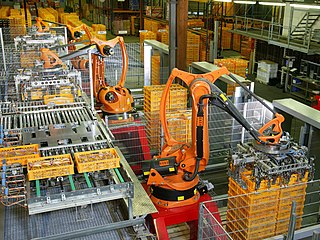
Biomedical engineering (BME) or medical engineering is the application of engineering principles and design concepts to medicine and biology for healthcare applications. BME is also traditionally logical sciences to advance health care treatment, including diagnosis, monitoring, and therapy. Also included under the scope of a biomedical engineer is the management of current medical equipment in hospitals while adhering to relevant industry standards. This involves procurement, routine testing, preventive maintenance, and making equipment recommendations, a role also known as a Biomedical Equipment Technician (BMET) or as a clinical engineer.

Food preservation includes processes that make food more resistant to microorganism growth and slow the oxidation of fats. This slows down the decomposition and rancidification process. Food preservation may also include processes that inhibit visual deterioration, such as the enzymatic browning reaction in apples after they are cut during food preparation. By preserving food, food waste can be reduced, which is an important way to decrease production costs and increase the efficiency of food systems, improve food security and nutrition and contribute towards environmental sustainability. For instance, it can reduce the environmental impact of food production.

Flexography is a form of printing process which utilizes a flexible relief plate. It is essentially a modern version of letterpress, evolved with high speed rotary functionality, which can be used for printing on almost any type of substrate, including plastic, metallic films, cellophane, and paper. It is widely used for printing on the non-porous substrates required for various types of food packaging.

Packaging is the science, art and technology of enclosing or protecting products for distribution, storage, sale, and use. Packaging also refers to the process of designing, evaluating, and producing packages. Packaging can be described as a coordinated system of preparing goods for transport, warehousing, logistics, sale, and end use. Packaging contains, protects, preserves, transports, informs, and sells. In many countries it is fully integrated into government, business, institutional, industrial, and for personal use.

Biochemical engineering, also known as bioprocess engineering, is a field of study with roots stemming from chemical engineering and biological engineering. It mainly deals with the design, construction, and advancement of unit processes that involve biological organisms or organic molecules and has various applications in areas of interest such as biofuels, food, pharmaceuticals, biotechnology, and water treatment processes. The role of a biochemical engineer is to take findings developed by biologists and chemists in a laboratory and translate that to a large-scale manufacturing process.

A medical device is any device intended to be used for medical purposes. Significant potential for hazards are inherent when using a device for medical purposes and thus medical devices must be proved safe and effective with reasonable assurance before regulating governments allow marketing of the device in their country. As a general rule, as the associated risk of the device increases the amount of testing required to establish safety and efficacy also increases. Further, as associated risk increases the potential benefit to the patient must also increase.

Food engineering is a scientific, academic, and professional field that interprets and applies principles of engineering, science, and mathematics to food manufacturing and operations, including the processing, production, handling, storage, conservation, control, packaging and distribution of food products. Given its reliance on food science and broader engineering disciplines such as electrical, mechanical, civil, chemical, industrial and agricultural engineering, food engineering is considered a multidisciplinary and narrow field.

Cold chain is a set of rules and procedures that ensure the systematic coordination of activities for ensuring temperature-control of goods while in storage and transit. The objective of a cold chain is to preserve the integrity and quality of goods such as pharmaceutical products or perishable good from production to consumption. Cold chain management earned its name as a "chain" because it involves linking a set of storage locations and special transport equipment, required for ensuring that temperature conditions for goods are met, while they are in storage or in transit from production to consumption, akin to the interconnected links of a physical chain.

Energy quality is a measure of the ease with which a form of energy can be converted to useful work or to another form of energy: i.e. its content of thermodynamic free energy. A high quality form of energy has a high content of thermodynamic free energy, and therefore a high proportion of it can be converted to work; whereas with low quality forms of energy, only a small proportion can be converted to work, and the remainder is dissipated as heat. The concept of energy quality is also used in ecology, where it is used to track the flow of energy between different trophic levels in a food chain and in thermoeconomics, where it is used as a measure of economic output per unit of energy. Methods of evaluating energy quality often involve developing a ranking of energy qualities in hierarchical order.
Nanotechnology is impacting the field of consumer goods, several products that incorporate nanomaterials are already in a variety of items; many of which people do not even realize contain nanoparticles, products with novel functions ranging from easy-to-clean to scratch-resistant. Examples of that car bumpers are made lighter, clothing is more stain repellant, sunscreen is more radiation resistant, synthetic bones are stronger, cell phone screens are lighter weight, glass packaging for drinks leads to a longer shelf-life, and balls for various sports are made more durable. Using nanotech, in the mid-term modern textiles will become "smart", through embedded "wearable electronics", such novel products have also a promising potential especially in the field of cosmetics, and has numerous potential applications in heavy industry. Nanotechnology is predicted to be a main driver of technology and business in this century and holds the promise of higher performance materials, intelligent systems and new production methods with significant impact for all aspects of society.
Industrial technology is the use of engineering and manufacturing technology to make production faster, simpler, and more efficient. The industrial technology field employs creative and technically proficient individuals who can help a company achieve efficient and profitable productivity.

Food packaging is a packaging system specifically designed for food and represents one of the most important aspects among the processes involved in the food industry, as it provides protection from chemical, biological and physical alterations. The main goal of food packaging is to provide a practical means of protecting and delivering food goods at a reasonable cost while meeting the needs and expectations of both consumers and industries. Additionally, current trends like sustainability, environmental impact reduction, and shelf-life extension have gradually become among the most important aspects in designing a packaging system.

Tetra Pak is a Swedish multinational food packaging and processing company headquartered in Switzerland. The company offers packaging, filling machines and processing for dairy, beverages, cheese, ice cream and prepared food, including distribution tools like accumulators, cap applicators, conveyors, crate packers, film wrappers, line controllers and straw applicators.

Manufacturing engineering or production engineering is a branch of professional engineering that shares many common concepts and ideas with other fields of engineering such as mechanical, chemical, electrical, and industrial engineering. Manufacturing engineering requires the ability to plan the practices of manufacturing; to research and to develop tools, processes, machines, and equipment; and to integrate the facilities and systems for producing quality products with the optimum expenditure of capital.
Aseptic processing is a processing technique wherein commercially thermally sterilized liquid products are packaged into previously sterilized containers under sterile conditions to produce shelf-stable products that do not need refrigeration. Aseptic processing has almost completely replaced in-container sterilization of liquid foods, including milk, fruit juices and concentrates, cream, yogurt, salad dressing, liquid egg, and ice cream mix. There has been an increasing popularity for foods that contain small discrete particles, such as cottage cheese, baby foods, tomato products, fruit and vegetables, soups, and rice desserts.

Krones AG is a German packaging and bottling machine manufacturer. It produces lines for filling beverages in plastic and glass bottles or beverage cans. The company manufactures stretch blow-moulding machines for producing polyethylene terephthalate (PET) bottles, plus fillers, labellers, bottle washers, pasteurisers, inspectors, packers and palletisers. This product portfolio is complemented by material flow systems and process technology for producing beverages for breweries, dairies and soft-drink companies.

Industrial engineering is an engineering profession that is concerned with the optimization of complex processes, systems, or organizations by developing, improving and implementing integrated systems of people, money, knowledge, information and equipment. Industrial engineering is central to manufacturing operations.

The Central Institute of Agricultural Engineering (CIAE) is a higher seat of learning, research and development in the field of agricultural engineering, situated in the lake city of Bhopal, Madhya Pradesh, India. It is an autonomous body, an Indian Council of Agricultural Research subsidiary, under the Ministry of Agriculture & Farmer's Welfare, Government of India.

Packaging machinery is used throughout all packaging operations, involving primary packages to distribution packs. This includes many packaging processes: fabrication, cleaning, filling, sealing, combining, labeling, overwrapping, palletizing.
Sudhir K. Sastry is a food engineer, academic, and author. He is a professor in the Department of Food, Agricultural and Biological Engineering at Ohio State University (OSU).















